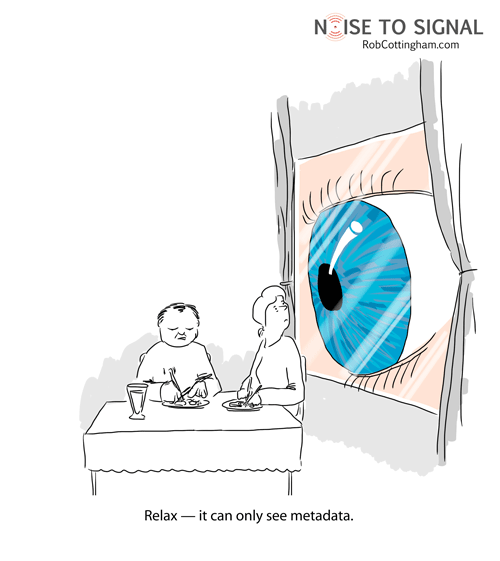A quick public service annountment: the Electronic Frontier Foundation does great work on this and many other issues. Learn more about the implications of NSA surveillance, and then take action to protect your privacy.
“Why are people so up in arms about government surveillance, when they already share all this stuff on Facebook anyway?”
That’s what someone asked me a few days ago. I argued that what people get to choose what they share on social channels (at least in principle), which got an eloquently unconvinced silence in reply.
Which is strange, because I don’t think anyone would have suggested a few decades ago that because you write letters to the editor or call phone-in shows, you should never have any privacy ever again.
Maybe it reflects an appetite out there for retribution against the Twitter generation for burdening the rest of us with their status updates about lunch. “You wanna live-tweet tonight’s episode of The Mindy Project? Ha! Surprise! Now the government knows about your walnut-shell fetish.”
Or maybe it’s that people aren’t really thinking through what a tiny proportion of our lives is still getting tweeted, pinned, blogged, uploaded and shared. I’m not posting “@robcottingham: Still asleep. Posted at 3:03 am. @robcottingham: Still asleep. Posted at 3:04 am. @robcottingham: Half-awake. Bladder full. Get up, or try to press on until 7? Posted at 3:03 am.” (That may be because I haven’t yet acquired a Fitbit Flex, and connected it to IFTTT… so stay tuned.)
Then again, a lot of our activity is getting shared with others. Just not with our friends and contacts. It gets shared with data warehouses, advertising vendors, telecom providers, search engines, and the rest of that long list of businesses that have found a way to mine profit out of the information we often don’t really know we’re handing to them.
Hey, big thanks to the crowd at the Noise to Signal Facebook Page, who helped me choose a caption for this cartoon! You can see the runners-up here.


